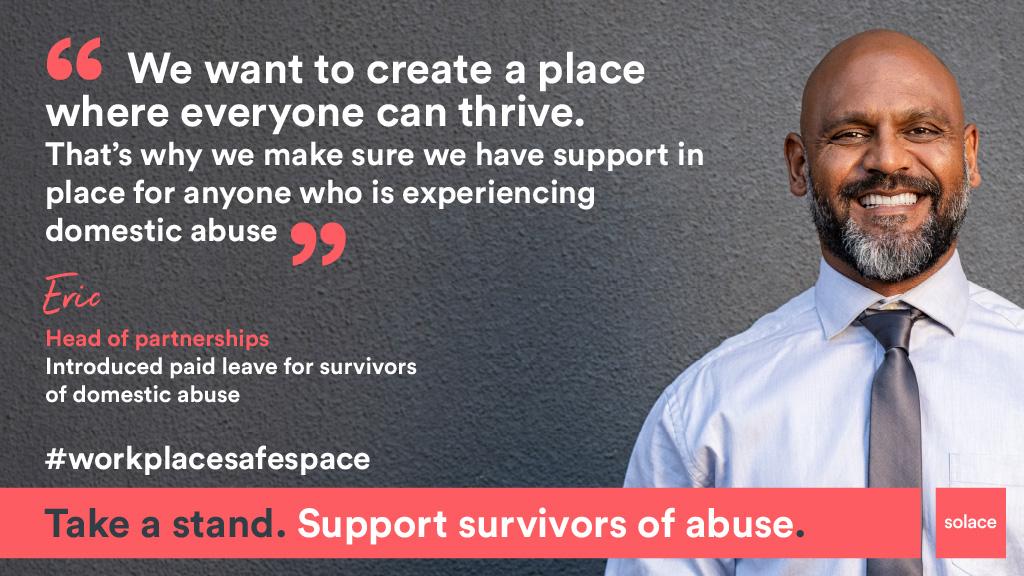We all want to work in a place where everyone can thrive. An organisational environment where people feel valued, respected and trusted means that everyone can achieve their potential. That’s why we work with organisations who are taking steps to support their employees who are experiencing domestic abuse and to tackle sexual harassment.

Perhaps you want to put in place structures and systems to support staff who might be experiencing domestic abuse at home. Maybe you are looking for ways to demonstrate that your organisation is taking a zero tolerance approach to sexual harassment. Whatever it is, we can help.
Through our training and consultancy services, we help workplaces strengthen their support for survivors of domestic abuse and sexual harassment. Our training could help your HR team and line managers respond effectively to a disclosure of abuse; help senior leaders make key policy and process decisions, and raise awareness of these issues across the whole team.
Find out more about our training below, and sign up for ‘Your workplace. Their safe space’ toolkit.
Our training packages
Domestic abuse and the workplace
When things aren’t right at home, they aren’t right at work either. For people experiencing domestic abuse, it can impact their health, their work and the people around them. That’s why more and more organisations are taking steps to support employees who are affected by domestic abuse.
Domestic abuse costs business an estimated £14 billion each year. But there are simple steps that workplaces can take to make sure survivors are supported, raising awareness of domestic abuse, ensuring key members of staff are trained to recognise and respond to domestic abuse, and time off to attend appointments and get the support they need.
We can all play our part in making sure that people who are experiencing domestic abuse can access the support they need to stay safe and be free from violence and abuse. Our training can help.
Sexual harassment and the workplace
Everyone wants to be able to work without the stress and worry of sexual harassment. But for around 53% of women and 20% of men, sexual harassment at work is a daily occurrence, leading to people being dissatisfied with work, taking more time off and leaving work in search of a better working environment.
More and more organisations are taking a stand against sexual harassment and committing to making their culture a place which protects people’s safety and dignity. When senior leaders take action and lead by example, when managers are trained to effectively identify and respond to sexual harassment, and when staff across organisations know what to do if they witness or experience harassment, it benefits everyone.
Impact Learning
Our impact learning sessions deliver key messages and learning points to inform and inspire positive action. These 60-minute sessions are a great way to introduce key topics to your team, during a lunch and learn session or a team meeting, for example.
We can deliver these workshops online as a webinar with up to 40 participants, or as an interactive workshop with up to 20 participants.
Available workshops are:
- Domestic abuse and the workplace – this workshop looks at the intersection of domestic abuse and the workplace, the impact on productivity, and the safety and wellbeing of survivors and their colleagues at work. Participants will learn practical strategies to effectively support their colleagues.
- Sexual harassment and the workplace – sexual harassment can be difficult to identify, and even more difficult to respond to. This session will help participants learn how to recognise sexual harassment and equip them with different strategies to safely respond and challenge behaviours, when it is happening to them and to someone else.
- Being a positive bystander – what can we do when we see or hear something that is harmful? How can we find the language, and the confidence, to stand up to oppressive behaviours? This session looks at identifying situations where we might want to intervene, and practical strategies for doing so.
About us
Why choose Solace
At Solace, we’ve been supporting survivors of abuse for over 40 years. Our background in providing frontline support for survivors who need it most gives us unique insight into the important role that workplaces can play in supporting survivors, providing security and support at a time when their lives are in turmoil.
Our training packages are designed with the survivor at their core, to ensure that the solutions work for them; and the needs of organisations in the forefront, to ensure that the learning and tools are practically implementable.
And, as a social enterprise, working with means investing in our cause. We reinvest our profits to enable us to reach and educate more people about abuse.
Our approach
We want people to get the most out of our training and across all of our packages we focus not only increasing knowledge and understanding, but developing people’s practical skills, confidence and behaviours to be able to put that knowledge into practice.
Our training is interactive, participatory, thought-provoking and sensitive to the needs of our participants. We know that when it comes to training, one size does not fit all. That’s why when you come to us, as standard, we will have an initial discussion with you to find out how we can tailor our packages to best meet the needs of your organisation and staff teams. We’ll ask questions about the challenges your staff are facing and what kind of outcomes you would like to see from this training to inform our approach.
Don’t just take our word from it – read what some of our clients have had to say here.


